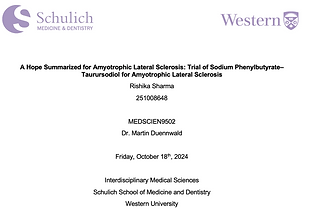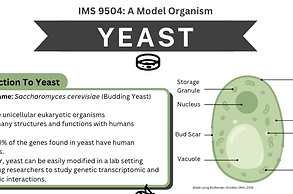Designing, Analyzing, and Interpreting Medical Science Research
M.Sc Interdisciplinary Medical Science 9502
Course Description As Taken From Syllabus:
This course will explore the theoretical framework of experimental design, focusing on the scientific method as it applies to neurodegenerative diseases, particularly Amyotrophic Lateral Sclerosis (ALS). Students will learn to identify and implement appropriate experimental controls, accurately replicate experiments, and integrate statistical analysis at the design stage, all through the lens of ALS research. The reproducibility crisis will be examined to highlight the critical importance of robust experimental design in advancing scientific research. In addition, the course will explore practical applications of major experimental approaches in medical science, with ALS case studies serving as a central theme. Students will evaluate and select experimental approaches for diverse research questions in both basic and clinical research on neurodegenerative diseases. Different methodologies will be compared and critically assessed for their advantages and limitations. The course will also cover statistical analysis of experimental data, emphasizing the interpretation of findings in the context of ALS and broader neurodegenerative disease studies.
Learning Objectives:
-
Develop a thorough understanding of the theoretical framework of different types of studies, experimental design, and important aspects of the scientific method.
-
Evaluate and select appropriate experimental and statistical methods for diverse research questions that are relevant to basic and clinical research, data quantification, analysis, and interpretation
-
Critically evaluate the reproducibility crisis and its implications for experimental design and scientific research and how to mitigate these problems.
Course Artifacts
These are some of the works I have produced in this course. Click on the button to view the entire project!


This assignment required creating two one-page handouts summarizing clinical trials for novel ALS treatments. Each summary included technical aspects such as the trial phase, mechanism of action, participant details, and statistical analysis. The summaries also highlighted the trials' goals, ethical considerations, and potential future directions. Designed for experts in the field, the handouts aimed to present concise and clear clinical trial data while building skills in interpreting and communicating complex medical research effectively.
This assignment required an in-depth exploration of the reproducibility crisis in biomedical research, its consequences, and potential solutions. Part 1 focused on defining the reproducibility crisis and discussing its major impacts on the scientific community, supported by relevant figures or statistics. Part 2 involved creating two sets of recommendations: six general guidelines to address reproducibility issues (e.g., proper record-keeping, data curation) and six cultural changes to improve scientific practices (e.g., fostering open communication, valuing negative results). The assignment emphasized critical thinking, the development of actionable solutions, and the recognition of broader cultural shifts needed to enhance reproducibility in research.

This assignment involved a group presentation on two assigned model organisms, summarizing their history, key contributions to biomedical research, and analyzing their advantages and limitations. The team worked collaboratively to create an engaging 15-minute presentation with supporting visuals and a 1-page handout. References were provided to ensure academic rigor, and a Q&A session encouraged further discussion. This task aimed to enhance understanding of model organisms' roles in research while fostering teamwork and presentation skills.

This assignment required preparing a 5-minute presentation on an assigned research methodology, focusing on its principles, workflow, and applications in biomedical research. The presentation introduced the methodology, highlighted its advantages and limitations, and included examples of model systems where it has been effectively applied. Participants also created a one-page handout summarizing key details and used visuals to engage the audience. This task aimed to enhance understanding of modern research techniques, encourage peer learning, and develop concise and impactful communication skills.
Reflection
The recent assignments collectively provided a valuable opportunity to deepen my understanding of various aspects of biomedical research, from ethical considerations to technical methodologies. They reinforced my ability to analyze complex datasets, summarize clinical trials, and critically evaluate the reproducibility crisis in science, all while honing my communication skills through written and oral formats. Each task challenged me to think critically, apply concepts to real-world scenarios, and engage both peers and target audiences effectively. These assignments also highlighted the importance of teamwork, precision, and clarity in presenting technical information. Overall, they served as a comprehensive refresher and skill-building experience, equipping me to approach scientific research and communication with greater confidence and competence.
